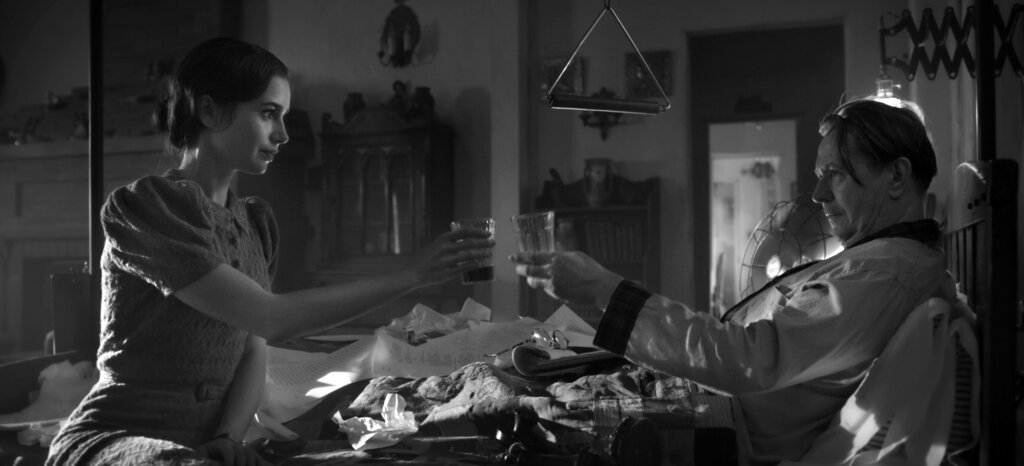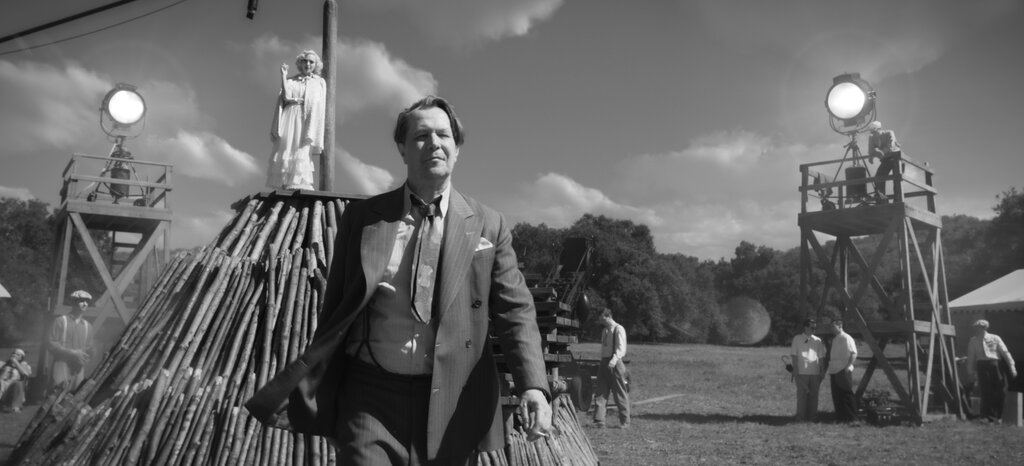Rebecca’s Take
Dripping in black-and-white splendor, the gorgeous “Mank” transports viewers back in time to Hollywood’s Golden Age. Netflix’s lush and introspective biopic follows brilliant but tortured screenwriter Herman Mankiewicz as he endeavors to write the Academy Award-winning script for one of the greatest movies ever made – “Citizen Kane.”
Director David Fincher’s passion project acts as both a love letter and a caustic critique of classic Hollywood. The transfixing Gary Oldman delivers a magnetic lead performance as the man at the center of the story. With its faithful production design, beautiful cinematography, witty dialogue and excellent acting, “Mank” is one of the year’s best films. The soaring masterpiece is sure to be an Academy Award contender in multiple categories.
In “Mank,” the alcoholic scribe is recovering from a car crash when he is asked to write a screenplay for Hollywood’s new boy wonder, Orson Welles (Tom Burke). The genius performer gives Mank a month to turn around what will eventually become the pages of 1941’s “Citizen Kane.”
For the story about a self-obsessed media magnate, the contemplative Mank finds inspiration from his time spent with billionaire newspaper mogul William Randolph Hearst (Charles Dance) and his mistress, dancer-turned-actress Marion Davies (Amanda Seyfried). But when the script gets out, Mank finds himself in an arduous battle to have the film made – and receive credit for what may be the best thing he’s ever written.
With its extraordinary attention to period detail, “Mank” recreates the feel and glamor of 1930s Hollywood. The movie’s breathtaking opening sets the stage as a plane swoops in to land at the private ranch where Mank is recovering. The film’s action effortlessly pivots from sweeping movie sets – including a Western that sees actors bombarded with clouds of smoke – to the MGM Studios lot and offices. Elegant dinner parties at Hearst’s estate feature women draped in gowns and the men in fine suits. Trent Reznor and Atticus Ross’s score perfectly channels the swelling orchestra sounds that accompanied films of the era, sounding different from anything the pair have done before.
Directing his first feature film since 2014’s “Gone Girl,” the masterful Fincher uses classic filmmaking techniques to simulate the period aesthetic. The director references the groundbreaking use of light and shadows in “Citizen Kane” by framing scenes in “Mank” in a similar manner. The camera often fades to black before it transitions to the next scene, sometimes focusing on the silhouette of a single character as we hear the closing dialogue. In one spellbinding scene, Oldman’s face serves as the central focus as the numbers of the California’s governor election whizz by on all sides.
Based on a screenplay written by Fincher’s deceased father, Jack Fincher, “Mank” bounces back and forth between the present day and flashbacks to tell its story. The effective technique echoes the same one used in “Citizen Kane,” one of several throwbacks to the landmark film. When “Mank” transitions to a flashback, a typewriter font announcing the setting splashes across the screen, just like a screenwriter would indicate in a script. It’s a nice touch in a film that celebrates the art of screenwriting. Like Mank himself, the script is wonderfully acerbic, moving at a fast clip. The dialogue is snappy and thrilling, pushing the story along.
As much love as “Mank” shows for classic Hollywood, the film takes unflinching aim at the political machine behind the studio system. “Mank” includes dead ringers of the powerful men who ran the big movie studios, including famously spectacled MGM head Louis B. Mayer (Arliss Howard) and his right-hand man Irving Thalberg (Ferdinand Kingsley). In the governor election, the executives throw their power behind the Republican candidate, going so far as to make propaganda films that present actors as real people to discredit the Democratic candidate. This twisting of the truth horrifies Mank, who unwittingly plays a role in the inception of the films.
After winning his first best actor Oscar for transforming into Winston Churchill in 2017’s “The Darkest Hour,” the outstanding Oldman is likely to pick up another nomination for “Mank.” The veteran actor makes the self-destructive genius likable despite his arrogance. Oldman portrays many facets of Mank’s complex personality, sometimes simultaneously. Mank is selfish but caring, egotistical but perceptive. He’s both an insider and outsider with a local connection – he grew up in Wilkes-Barre, though the film doesn’t reference the city. That duality is what makes the audience root for Mank as he seeks to expose Hollywood’s machinations. Oldman spits out his pent-up frustration during a magnificent monologue at a dinner party where he gives the pitch for “Citizen Kane.” It’s a bravura performance that could win Oldman his second Academy Award.
Surrounding Oldman is a fantastic supporting cast. Seyfried gives the best performance of her career as the underestimated Davies, which should merit her consideration for best supporting actress. Davies is whip-smart, but the starlet must hide her intelligence around Hollywood’s bigwigs. Seyfried and Oldman share a sweet camaraderie and industry insights that make Mank and Davies’ friendship believable. Without a single line of dialogue, the actress says a lot through her facial expressions alone during a late scene.
Lily Collins shines as Rita Alexander, Mank’s secretary who’s not afraid to challenge the screenwriter on his script – or drinking tendencies. Tuppence Middleton impresses as Mank’s long-suffering wife Sara, who’s more of a spitfire than she appears. In an understated performance, Dance imbues the steely Hearst with humanity. As Mank’s brother, Tom Pelphrey’s cool-headed, mild-mannered Joseph Mankiewicz – who became a Hollywood heavyweight in his own right – serves as a foil to his fiery, fast-talking brother.
Like its titular character, “Mank” is brilliant but not perfect. Much of the film’s marketing has focused on the battle for screenwriting credit between Welles and Mank over “Citizen Kane,” but the controversy is portrayed as more of an argument. The film is told from Mank’s perspective, so the script favors the troubled screenwriter. For viewers who want to know more about the controversy, you may have to do some additional research for a more balanced take.
Because of the obvious slant, “Mank” often shows Welles in ominous shadow, reinforcing its view that the legendary director is the villain of the story. As a result, Burke’s Welles gets little screentime, relegating him to the sidelines in the “Citizen Kane” origin story.
An ode to classic Hollywood, “Mank” is extraordinary filmmaking, paying tribute to while dissecting the industry to which it owes its existence. After a six-year break from movies, Fincher has made a masterpiece bathed in black and white that examines the moral gray areas in between. The legacy of “Citizen Kane” still reverberates today as “Mank” continues asking us to question how those with power wield it. With its stunning visuals, clever script and Oldman’s phenomenal acting, “Mank” is a triumph on all levels, likely to make its mark on the Oscar race.
4.5 out of 5 stars

Lily Collins and Gary Oldman star in “Mank.”
Joe’s Take
David Fincher is one of my favorite directors and one of the best in the business. He took a six-year break in between films, his last was 2014’s “Gone Girl,” with Netflix series “Mindhunter” sprinkled in the middle somewhere. The acclaimed director had a great stretch from 2007-2011 when he worked on “Zodiac,” “The Curious Case of Benjamin Button,” “The Social Network” and “The Girl with the Dragon Tattoo.” 2010’s “The Social Network” is one of my favorite films ever. Fincher teamed with my favorite writer Aaron Sorkin, who won the Oscar that year for best adapted screenplay. Most of Fincher’s films have a dark and disturbing touch to them, so “The Social Network” proved a bit of a departure. He went in a similar direction with Netflix’s “Mank,” but this time his father, Jack, penned the script. The fast-paced dialogue provided verbal action I always enjoy. This proved just one of the ways “Mank” and Fincher amazed me.
The fact Fincher’s father wrote the script leads me to believe this was a passion project. That would explain the attention to detail. Well, that and Fincher’s usual insane hunt for perfection where he has made actors do almost 100 takes of scenes in the past. This film needed that kind of care because “Citizen Kane” is seen as one of the greatest movies of all-time, if not the greatest. Nobody wants their classics messed with, and “Mank” simply adds to its lore. It’s the story of Herman Mankiewicz, who wrote the screenplay for “Citizen Kane,” and the moments in his life that got him to write that story.
The writing is great, and the actors elevate the script to its highest potential. In his first major film since winning best actor for his role as Winston Churchill in 2017’s “Darkest Hour,” Gary Oldman (Herman Mankiewicz) doesn’t miss a beat. He balances charm with repulsiveness as he builds healthy and antagonistic chemistry with a lot of characters. He further proved he’s an excellent actor who can do it all. Amanda Seyfried (Marion Davies) is the best she’s ever been. I’ve enjoyed her career, but her films have never given her a chance to shine like this. She made the most of it. She goes toe-to-toe with veteran actors. She’s a veteran herself, but still much younger than her co-stars. In a film of elite talent, she commands the screen and creates great chemistry with Oldman.
Lily Collins (Rita Alexander) serves as Mankiewicz’s assistant who types the screenplay. Her relationship with Oldman’s character evolves beautifully. She stands out in a supporting role. Besides winning the “I know I’ve seen her in something before award,” Tuppence Middleton (Sara Mankiewicz) also stands out in her limited role. I thought she was awesome as Mankiewicz’s wife. She seems like a woman who wouldn’t stay with a guy like Mank, but she is strong-willed and the only one who can handle him. Mank needs her as well.
The cast is deep with a lot of great performances, but the other one I want to touch on is Tom Pelphrey (Joseph Mankiewicz). He plays Mankiewicz’s brother perfectly. They have a believable brotherly chemistry, and Pelphrey has a beautiful scene with Oldman toward the end of the film. On a side note, I finally watched “Ozark” and Pelphrey is excellent in that, too. So, let’s get this guy into more projects.
Erik Messerschmidt’s cinematography is absolutely gorgeous and probably will win an award at the Oscars if they happen in April. The black and white give the film a perfect classic feel, but the movie also looks pristine. It beautifully captures films in that time period. The top-notch sound design contributes to that as the characters’ voices have the acoustics of a giant room where the sounds almost echo. That matches how actors sounded in film during that time period.
Trent Reznor and Atticus Ross have been Fincher’s go-to composers ever since they won an Oscar for “The Social Network.” This score is a departure from their usual style, but they nail it. The classical score fits perfectly into the sound design. Fincher perfectly brings it all together as his vision is often unmatched.
I know I’ve thrown the word perfect around this review multiple times, but for some reason I didn’t love it as much as I probably should have. I just never escaped into the film. I knew what I was watching was incredible, but at the same time I knew I was watching a movie trying so hard to be a classic film. It took me a while to connect with the story. “Mank” reminded me how I felt after watching 2014’s “Boyhood,” a film shot over 12 years so the actors had time to age. It was an incredible achievement, but I struggled to connect with the story. I was aware of what the film was trying to accomplish. “Mank” is a much better film than “Boyhood,” but I knew it was trying to be a film from the 1930s and it’s 2020. It did grab me toward the end, but I didn’t have the attachment I feel I should have had. Maybe a second viewing will change my opinion.
Fincher is such a good director that it’s difficult to hand him a 5 out of 5 stars, especially since “The Social Network” and “Zodiac” are better films than “Mank.” I don’t think the fact that he’s done better work should stop him from getting a perfect score, but that combined with my lack of attachment to the film has to knock it down slightly. “Mank” is an incredible cinematic achievement that may win best picture come Oscar time. I won’t be upset about that, because this film is about as close to perfection as it can be without reaching that level.
4.5 out of 5 stars

Rebecca Kivak and Joe Baress write about movies for Take 2 blog. Together, they review current flicks and offer their insights into the latest movie news. Rebecca is a copy editor and page designer at The Times-Tribune. She started her career with Times-Shamrock Newspapers in 2005 and has won several professional journalism awards for page design and headline writing. She also covers NASCAR races from Pocono Raceway. Contact: rkivak@timesshamrock.com; 570-348-9100 x5126; @TTRebeccaKivak



